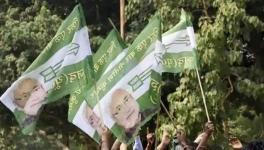Bihar: Three 900-Year-Old Ponds in Darbhanga Get New Lifeline as NGT Bans Illegal Construction
Patna: Amid reports of rampant illegal encroachment of ponds by the powerful land mafia across Bihar, the National Green Tribunal (NGT) has come forward to save and conserve three big ponds in Darbhanga district of the state. The NGT's move is being widely seen as good news for saving ponds from illegal encroachment.
On Thursday, Kolkata's NGT eastern zone bench ordered a blanket ban on illegal construction around three ponds in Darbhanga town. The three 900-year-old ponds -- Harahi, Dighi, and Ganga Sagar – have been lifelines for people for centuries.
"It is a big development to save ponds in Darbhanga. The NGT order to ban any kind of illegal construction around three ponds will pave the way for conserving other ponds in the town. It should be noted that NGT's order assumes much significance because three ponds are nearly 900 years old and considered heritage water bodies of the Mithilanchal region of the state. Now three ponds will be freed from encroachment," Narayanjee Choudhary, who runs the Talab Bachao Abhiyan(TBA), told NewsClick.
Choudhary said NGT's ban would help TBA, a people's initiative to create awareness to save and conserve ponds in Darbhanga, at a time when ponds are disappearing at a faster rate, thanks to negligence of the district administration and non-seriousness of the department officials concerned, who are responsible for protecting ponds.
In recent years, TBA has staged several dharnas and taken out street marches to oppose the illegal encroachment of ponds and illegal construction.
The NGT's order results from a petition filed by TBA's convenor.
"The NGT has also issued a directive to constitute a committee to study the issues raised by TBA, including how untreated sewage and wastewater were being discharged through drainage by Darbhanga junction as well as municipal corporation directly into the Dighi pond, due to which flora and fauna of the pond were severely affected," Choudhary said.
Choudhary pointed out that the three ponds are in the heart of Darbhanga and are interconnected. They are historical and rare pieces of water bodies. Ganga Sagar, Dighi and Harahi, from North to South, have a total length of 1.8 km, divided by two roads from East to West at Railway Station Chowk and Donar chowk.
He said there are dozens of other big ponds in Darbhanga, which are 300 to 200 years old and are victims of neglect and encroachment. Some of them have become dumping grounds for garbage and waste.
According to TBA's lawyer Kamlesh Kumar Mishra, as per the NGT order, a member secretary of the state wetland authority, an official of the state pollution control board, Samastipur railway division DRM, District Magistrate of Darbhanga and a municipal commissioner will be a member of the committee to suggest measures to save ponds.
The flood-prone Darbhanga and other neighbouring districts of the Mithilanchal region are known as hubs of ponds. However, many have been encroached by powerful people or dried up over the years due to negligence. Following the water crisis in the city, Darbhanga district magistrate Thiyagarajan SM constituted four separate teams of officials to survey the ponds..
Choudhary said there was documentary evidence of more than 300 ponds in Darbhanga town in the 1960s; by the 1990s, the number has come down to 200, and now, it is less than 100.
Ranjeev, a water activist, told NewsClick that the NGT order has once again exposed the state government's seriousness in saving and reviving water bodies and freeing water bodies from encroachment.
"The much-hyped Jal-Jivan-Harilayi-Abhiyan of the government is on paper only, not on the ground as thousands of ponds are still under illegal encroachment and the government so far failed to free them."
The government launched a campaign in 2019 to free water bodies from encroachment and to help rainwater harvesting and groundwater conservation to tide over times of drought, flood and drinking water crisis in the state – it is now linked to the much-publicised Jal Jeevan Hariyali Mission of Bihar, under which farmers get a subsidy to create ponds.
This campaign is part of the Disaster Risk Reduction Roadmap 2015-2030, which mandates action for water conservation by concerned agencies. It was then claimed that the operation to conserve water bodies would focus on removing encroachment of ponds, lakes, canals, ahar and pines (traditional water harvesting systems), drains, water drainage channels and rivers.
Get the latest reports & analysis with people's perspective on Protests, movements & deep analytical videos, discussions of the current affairs in your Telegram app. Subscribe to NewsClick's Telegram channel & get Real-Time updates on stories, as they get published on our website.
























